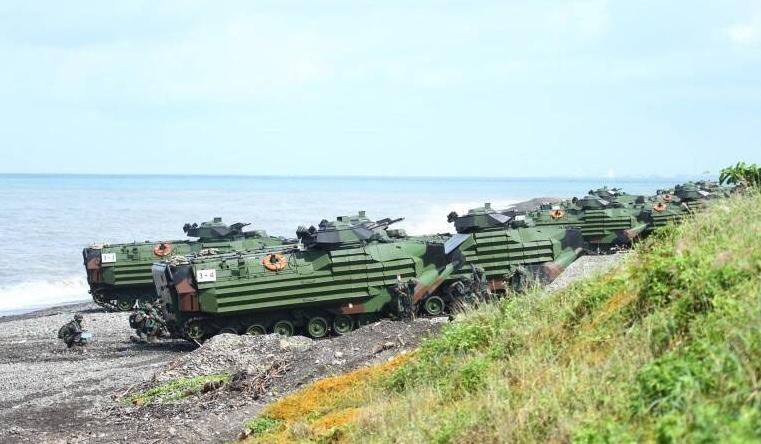The US and Taiwan signed a two-year specialized training program for Taiwan’s navy, the Ministry of National Defense said today, in an unexpected announcement confirming US training.
The US has a history of stationing military instructors and special ops teams in Taiwan to quietly assist with training, but details have been classified.
On Jan. 2, the ministry’s military delegation to the US signed an agreement with the American Institute in Taiwan, an announcement from the ministry showed.

Photo: Chen Yen-ting, Taipei Times
The agreement stated that the US government would send personnel to Taiwan to conduct a two-year specialized naval training program with a budget of NT$49,887,240 (US$1,516,109).
The training program would take place at Kaohsiung’s Zuoying (左營), the headquarters of the navy and marine corps.
The program is likely related to amphibious combat training with the amphibious naval fleet and marine corps.
Although the budget is not high, it is the first time a “specialized training program” with the US has been officially announced, a military source said on condition of anonymity.
The US has changed its low-key and confidential training approach to a semi-public approach, testing political and public reactions, the source said.
The US and Taiwan had previously implemented a training regime in which the US military instructed Taiwan’s amphibious naval fleet and marine corps on joint operations.
However, the project was interrupted when official relations between the US and Taiwan were severed, until 2017 when small-scale exchanges resumed.
In recent years, the marine corps has been sending troops to the US and Guam to receive military training, according to military reports.
The US has also sent senior instructors and small units to Taiwan to provide combat training assistance, but no public confirmations have been made until now.

US President Donald Trump said "it’s up to" Chinese President Xi Jinping (習近平) what China does on Taiwan, but that he would be "very unhappy" with a change in the "status quo," the New York Times said in an interview published yesterday. Xi "considers it to be a part of China, and that’s up to him what he’s going to be doing," Trump told the newspaper on Wednesday. "But I’ve expressed to him that I would be very unhappy if he did that, and I don’t think he’ll do that," he added. "I hope he doesn’t do that." Trump made the comments in

NOT AN OPENING: Trump’s violation of international law does not affect China’s consideration in attacking Taiwan; Beijing lacks capability, not precedent, an official said Taiwanese officials see the US’ capture of the president of Venezuela as a powerful deterrent to Beijing’s aggression and a timely reminder of the US’ ability to defeat militaries equipped with Chinese-made weapons. The strikes that toppled Venezuelan President Nicolas Maduro signaled to authoritarian leaders, including Chinese President Xi Jinping (習近平), US President Donald Trump’s willingness to use military might for international affairs core to US interests, one senior official in Taipei’s security circle said. That reassured Taiwan, the person said. Taipei has also dismissed the idea that Trump’s apparent violation of international law could embolden Beijing, said the official, who was not

A cold surge advisory was today issued for 18 cities and counties across Taiwan, with temperatures of below 10°C forecast during the day and into tonight, the Central Weather Administration (CWA) said. New Taipei City, Taipei, Taoyuan and Hsinchu, Miaoli and Yilan counties are expected to experience sustained temperatures of 10°C or lower, the CWA said. Temperatures are likely to temporarily drop below 10°C in most other areas, except Taitung, Pingtung, Penghu and Lienchiang (Matsu) counties, CWA data showed. The cold weather is being caused by a strong continental cold air mass, combined with radiative cooling, a process in which heat escapes from

Snow this morning fell on Alishan for the first time in seven years, as a strong continental cold air mass sent temperatures plunging across Taiwan, the Central Weather Administration (CWA) said. The Alishan weather station, located at an elevation of about 2,200m in central Taiwan, recorded snowfall from 8:55am to 9:15am, when the temperature dropped to about 1°C, the CWA said. With increased moisture and low temperatures in the high-altitude Alishan area, the conditions were favorable for snow, CWA forecaster Tsai Yi-chi (蔡伊其) said. The last time snow fell at the Alishan weather station was on Jan. 10, 2018, while graupel fell there